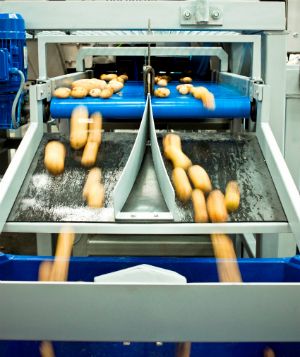Sorting the Good from the Bad: A Smart Investment in Food Safety, says TOMRA

Data revealing aflatoxins to be the biggest cause of food-related recalls demonstrates the important role effective sorting and quality analysis systems can play in boosting food safety on the production line, says TOMRA Sorting Food.
The first quarter European Recall and Notification Index produced by Stericycle Expert Solutions, found that aflatoxins, a fungal toxin that contaminates crops, were behind 21% of all food recalls, followed by salmonella, pesticides/fungicides, metal fragments, chemicals, listeria, insects and E. coli.
Despite an overall drop in food recalls in the last quarter of 2014, there was a 67% increase in recalls relating to nuts, largely as a result of issues with products coming from India and China.
Those originating in China spread to 13 countries and were primarily due to aflatoxins.
TOMRA Sorting Food head Ashley Hunter says that implementing sorting technology can significantly reduce the risk of contamination from aflatoxins, mycotoxins and foreign material, driving up food safety on the production line and offering a smart investment for processors and manufacturers.
Hunter said: "Effective food sorting and analysis equipment have a huge role to play in consumer and brand protection so implementing these processes makes good business sense.
"Good food safety performance protects consumers, which in turn protect the corporate brand.
"The data from Stericycle Expert Solutions demonstrates the challenge faced by food processors operating within a global supply chain.
"The food industry is growing significantly and facing productivity, economic, efficiency and environmental pressures more than ever before.
"Increasing demand on the world’s food resources has made today’s food supply complex and multifaceted, and whilst a global supply chain brings many benefits it also presents a major food safety headache.
"The longer and more complicated the chain is, the higher the risk of contamination and spoilage.
"In addition, increasing exports and imports mean food processors and manufacturers have to comply with numerous cross-border regulations.
"In some cases, imports are from countries where safety standards are lower than in the EU or US, making it all the more necessary to ensure food sorting and analysis systems operate in line with emerging food safety issues."
Hunter says the implementation of the Food Safety Modernisation Act (FSMA) in the US is important for nations around the world.
Taking a ‘prevention is better than the cure’ approach, the act makes food safety the responsibility of all links between field and fork and encourages a co-ordinated domestic and international strategy.
While the idea of prevention is not new, the recognition that for all the strengths of the US food supply chain, a breakdown between farm and fork can have a disastrous impact and cause significant economic loss to the food industry.
TOMRA Sorting Food’s focus on research and development has enabled it to develop a range of innovative sorting machines, which are able todetect and remove the smallest of defects and foreign material from production lines.
TOMRA machines use a variety of sensors which go beyond the common use of colour cameras.
Near infrared (NIR) spectroscopy enables an analysis of the molecular structure of a product while x-rays, fluorescent lighting and lasers measure the elemental composition of objects.
The internal composition and surface structure of objects can also be analysed to determine good or bad produce.
Hunter said: "The benefits of sorting technology are far-reaching.
"Beyond food safety and brand protection, it enables processors to deliver consistently high quality products to their customers, maximising yield and profit whilst reducing food waste, a great concern for the supply chain as the world’s population continues to grow.
"As safety regulations and the demand for food have increased, optical and sensor-based sorting has become a requisite rather than a luxury for many producers who have previously relied upon manual sorting and inspection."
"Furthermore, processors are also increasing the number and variety of sorting and analysis machines on their lines to ensure they are eliminating poor quality product and foreign material as much as possible.
"With millions of individual product items passing through every hour, robust systems which can detect and remove the smallest of contaminants are vital in managing food safety on the production line."
